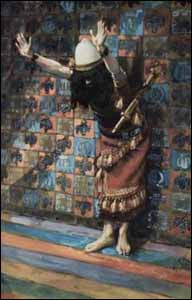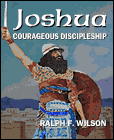
|
Old Testament
New Testament
Gospels
Acts
Paul's Letters
General Letters
Revelation
Topical Studies
Beginning the Journey (for new Christians). en Español

|
Old Testament
New Testament
Gospels
Acts
Paul's Letters
General Letters
Revelation
Topical Studies

|
Home
Bible Studies
Articles
Books
Podcasts
Search
Menu
Donate
About Us
Contact Us
FAQ
Sitemap
 James J. Tissot, 'Joshua in the Sanctuary' (1896-1902), gouache on board. Jewish Museum, New York. |
The Book of Joshua is the sixth book in the Bible and covers the period from the death of Moses to the Conquest of the Promised Land under the leadership of Joshua.
Title
The book is named after its chief character Joshua, Moses' successor. Joshua's name means "the Lord is Salvation." Centuries later, Jesus was given the same name. Another form of the name is Hoshea, the name of one of the prophets whose prophecy is found in the book of Hosea.
Purpose
The Book of Joshua purposes to show the historical fulfillment of God's promises to the patriarchs and to Moses to give the land of Canaan to them as a possession. This is evident at the beginning of the book:
"Moses my servant is dead. Now then, you and all these people, get ready to cross the Jordan River into the land I am about to give to them -- to the Israelites. I will give you every place where you set your foot, as I promised Moses." (1:2-3)
It is also repeated among the last few verses:
"So the LORD gave Israel all the land he had sworn to give their forefathers, and they took possession of it and settled there.... Not one of all the LORD's good promises to the house of Israel failed; every one was fulfilled." (21:43, 45)
Historical Background
While scholars place the Exodus and the Conquest in the Late Bronze Age, they argue whether to accept the "early date" of the Conquest (about 1447 BC) vs. the "late date" (about 1250 BC, in the early reign of Ramesses II). The key questions for dating are one's interpretation of 1 Kings 6:1 and Judges 11:26. But dating is more complex than you'd expect at first glance, when you look at evidence from ancient Near Eastern records and archaeology. You can find the issues discussed in a Bible dictionary under a topic such as "Old Testament Chronology."
I believe that the Book of Joshua accurately reflects the historical events it represents -- even the miracles. Of course, we must judge the book by the historical standards and literary methods of its own time, not ours.
Literary Genre
The book of Joshua contains a number of literary forms that we see in other Near Eastern texts of the period -- annals of military campaigns, suzerain/vassal treaties, boundary descriptions, town lists, but particularly the genre of land grants. For example, Joshua bears similarities to the Alalakh grant (AT 456) given by the king of Ugarit to his subjects (18th century BC).[1]
Authorship and Date
There has been much debate about the author and date. Due to Joshua's clear affinities with Deuteronomy, proponents of the now discredited Deuteronomic Hypothesis sought to date the book after the Exile.
However, the book contains several references that indicate that it was written not too long after the events. For example, the 12 memorial stones to commemorate the crossing of the Jordan "are there to this day" (4:9; see also 7:26; 8:28; 10:27), so perhaps these events were recorded within one or two hundred years of their occurrence, and perhaps sooner. I believe that Joshua probably took its major form prior to the monarchy, even if there may have been some minor editing later.[2]
No author is mentioned in the text. The book of Joshua has been accepted as part of the Jewish and Christian canons from earliest times.
Reading Joshua
I recommend that you read the book in two or three sittings to get an idea of the whole span of the Conquest. You'll find it far more interesting if you can follow what's going on geographically. Read with a Bible atlas open or refer often to maps that may be included in the back of your Bible. You'll also find detailed maps included in this study.
Outline of Joshua
The book of Joshua falls into three main sections:
- The Conquest (1:1-12:24)
- The Israelite Tribal Allotments (13:1-21:45)
- The Conclusion: Proper Worship of God (22:1-24:33)
Studying Joshua

Lessons in book formats are available. |
You'll find questions in each lesson to guide you in your thinking and meditation. I encourage you to try to answer each question in writing, which will help you to gain the most spiritual understanding. You can post your answers and read others' answers on the Bible Study Forum at the web address given below each question.
You might consider memorizing some of the key verses of Joshua during the study. Print them on cards and tape them to your mirror to help you remember. Plan to finish spiritually richer than when you began.
Prayer
Our Father. We ask you to instruct us as we study, read, meditate, and discuss. Change our lives and thinking so that we might become, through faith, all you want us to be. In Jesus' name, we pray. Amen.
Endnotes
[1] Hess (Zondervan), Joshua, Judges and Ruth, introduction.
[2] Bruce K. Waltke ("Joshua, Book of," ISBE2:1136-1138) essentially adopts the conclusions of Jewish scholar Yehezkel Kaufman, who argues for a date of composition at the beginning of the period of Judges (Yehezkel Kaufmann, Biblical Account of the Conquest of Palestine (1953).
Copyright © 2026, Ralph F. Wilson. <pastor![]() joyfulheart.com> All rights reserved. A single copy of this article is free. Do not put this on a website. See legal, copyright, and reprint information.
joyfulheart.com> All rights reserved. A single copy of this article is free. Do not put this on a website. See legal, copyright, and reprint information.


 To be notified about future articles, stories, and Bible studies, why don't you subscribe to our free newsletter, The Joyful Heart, by placing your e-mail address in the box below. We respect your
To be notified about future articles, stories, and Bible studies, why don't you subscribe to our free newsletter, The Joyful Heart, by placing your e-mail address in the box below. We respect your